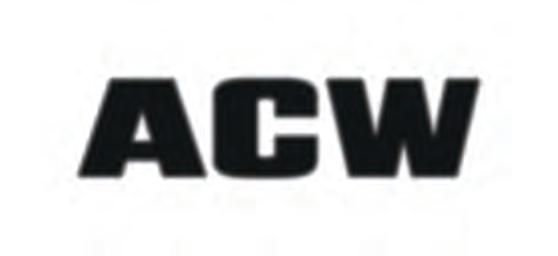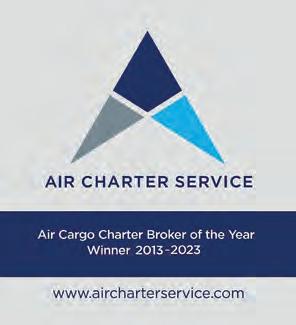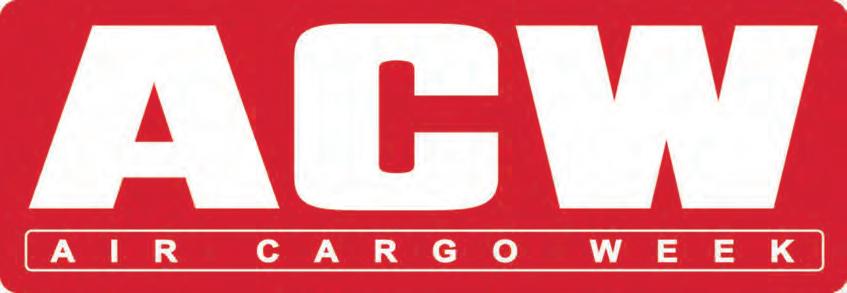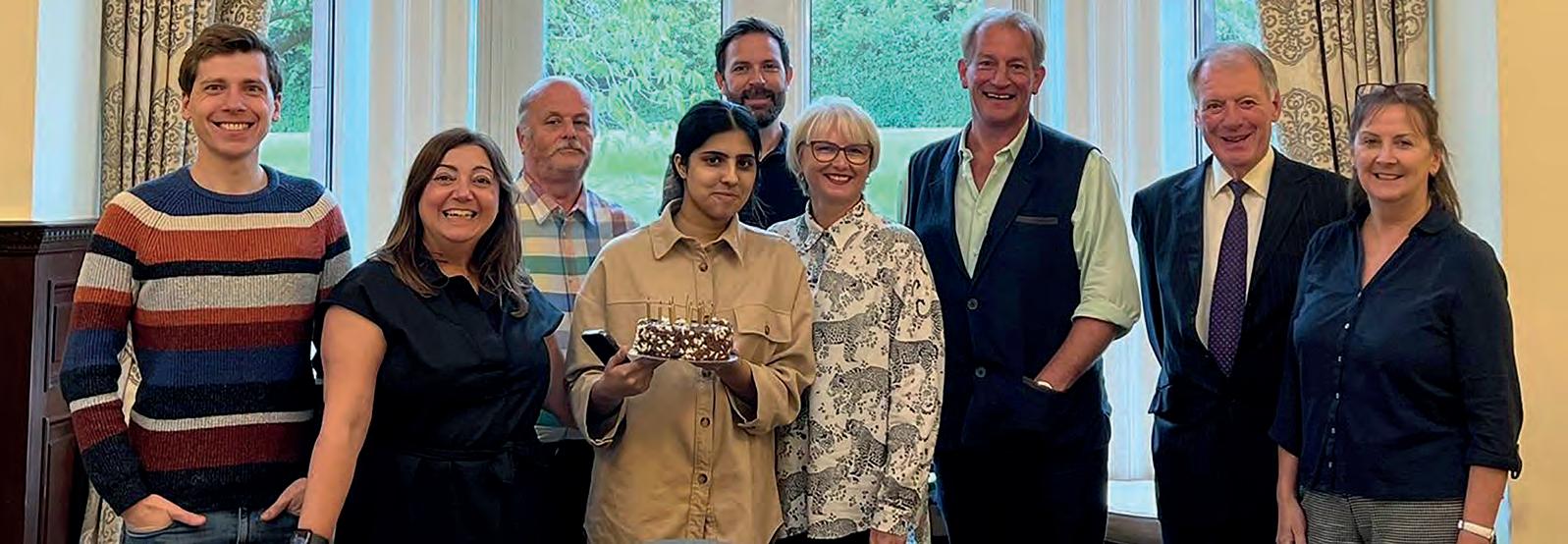
























The weekly newspaper for air cargo professionals



No. 1,250 02 October 2023





























No. 1,250 02 October 2023
After a quarter of a century at the helm of the world’s only weekly newspaper for airfreight professionals, Air Cargo Week’s Director Norman Bamford has turned a page in his outstanding decades-long career.

The sixty-year industry veteran has sold the air cargo media and events business A-Z Group Limited (Azura International) to a company owned by airfreight media maven Audrey Serdjebi, with Steven Polmans taking on the role of ACW’s new managing director.


“The growth and development of our business over the last thirty years has been one of the most interesting experiences of my sixty-year career in the air cargo sector,” Bamford said, discussing his decision to sell A-Z Group Limited.
“However, change is inevitable and with the
existing proprietors’ retirement unavoidable, a change of ownership became the logical path to further development of the company, enhancing its talent base and adding value to this vital industry.”
A-Z Group is passing our business on to an organisation that shares its passion for the industry and has the skills and vision to build on the solid base that Azura International has established.
“In a constantly changing world, I’m confident that they have a commitment to sustainability and a determination to remain an integral part of the global air community,” Bamford continued.
Having had the pleasure of working with Serdjebi for 12 years, Bamford has seen first-hand how she is one of the most creative and innovative personalities in the airfreight industry.
“Driven by their inspired leadership, the existing
staff will work closely with Steven, delivering a strong, enthusiastic team that builds on our current portfolio of airfreight news, events, and awards,” Bamford stated.

“My deep affection for the air freight industry and my desire to contribute to its transformation through the media inspired me to buy Azura International,” Serdjebi said. “Norman’s offer to buy his well-respected publication was perfect, given his guiding influence in the air cargo industry to me and so many others.”
“The editorial team at Air Cargo Week is highly regarded for its journalistic expertise and timely reporting, with many members having worked for the publication for several years. I greatly admire their dedication, consistency, and professionalism, always managing the journal with unwavering enthusiasm,” she added.
IN the spirit of transparency, one of the many values that unite ACW and the new leadership team, Steven Polmans shares, in his own ...

VISIBILITY THROUGH INNOVATION ... SEAMLESS collaboration and real-time visibility are crucial to optimising supply chain processes. Awery Aviation Software is seeking to find ...
DRIVING THE INDUSTRY ... PAGE 4
DELIVERING DANGEROUS GOODS ... DIGITAL insurance innovator Breeze has secured insurance capacity backing from USbased insurance company CNA, allowing for wider ... PAGE 6
SAFEGUARDING SUPPLY CHAIN ... PAGE 8
THE air freight industry finds itself facing a rapidly growing threat. Efficient and quick transport of goods is essential in a fast-paced, global ...


IN the spirit of transparency, one of the many values that unite ACW and the new leadership team, Steven Polmans shares, in his own words, how his 25+ years of air cargo expertise across the globe and the industry is the ideal fit for this new role.
Maintaining the comprehensive coverage that has made ACW a staple of the industry, Polmans is excited to take on the challenge of driving positive change alongside the publication’s long-standing editorial team.

“Fostering collaboration to drive the industry forward.”
“My motivation is driven by my passion for the air cargo industry and a desire to contribute to its evolution,” Polmans explained.
“Throughout my career, I have been deeply committed to fostering collaboration to drive the industry forward. Air Cargo Week plays a crucial role in facilitating knowledge exchange and driving conversations about the industry’s challenges and opportunities, the first step in building a stronger air cargo ecosystem.”
“By heading Air Cargo Week, I see immense potential to continue its vital role of bringing the air cargo community together. I’m really excited to start something new, something that is also pushing me beyond my personal boundaries.”
Taking on the role at ACW, Polmans will be focused on creating insightful and thought-provoking content that address the rapidly changing landscape of the cargo industry, with a particular emphasis on sustainability, digitalisation, and emerging trends.
“To be clear, my main concentration will be strategy. I’m not a journalist and do not plan nor have the ambition to become one,” he explained. “As MD, I will bolster the already exceptional work of the current editorial team by providing additional support and resources.”
Air Cargo Week’s commitment to delivering valuable and
engaging content combined with his passion for bringing the air cargo community together makes this role a perfect fit for Polmans.
“Together, we can ensure that the newspaper continues to play a crucial role in shaping a brighter future for the air cargo industry and all its stakeholders,” he continued.
‘My vision is to use Air Cargo Week as a catalyst for the industry’s advancement.’
Filling the void left by Norman Bamford’s widely-respected leadership of A-Z Group and Air Cargo Week, Polmans will bring significant added value through his industry experience, wide-ranging expertise and vast network.
“Having worked in many countries and across different disciplines for twenty-five years, I can bring the entire sector closer to Air Cargo Week and Air Cargo Week closer to the business,” Polmans stated. “ I’m known for my ‘collaboration drives positive transformation’ ethos. In fact, a colleague once said that my business card should read ‘bringing people together.’”
Throughout his career, Polmans has always strived for improvement, collaborating with others to find the best solutions in a positive way.
For instance, when he became the Chair of TIACA, the association was in troubled water. To avoid it losing its purpose, he proposed finding a new approach to spark growth. With the stakeholders, they rebranded and revitalised TIACA to be the leading air cargo association.
“There are always opportunities – and by working with people, you’ll find them,” Polmans added.
“My vision is to use Air Cargo Week as a catalyst for the industry’s advancement. Most importantly, we will inform and brief the industry with invaluable information and contributions in a timely and efficient manner,” Polmans said.
“Through thoughtful reporting and insightful commentary, we can foster a spirit of collaboration among stakeholders, driving collective efforts towards a more performant and sustainable air cargo industry,” he laid out.
Under its new leadership, ACW will continue to address challenges head-on, promote responsible practices, and seize emerging opportunities to strengthen the air cargo ecosystem, making it even more robust and efficient.
amplifying their position in the industry as a benchmark of success and exploring how to make the selection process more transparent to broaden the field of winners.
‘Transparent and ethical behaviour are a priority.’ With its new managing director, ACW will work together as a team to ensure the newspaper maintains its leading role in shaping a brighter future for the air cargo sector.
“In 2016, I launched Air Cargo Belgium to unite the airfreight community at Brussels Airport. At first, each stakeholder had their arms crossed at the table. I built up trust by being transparent and balancing their needs,” Polmans explained. “My philosophy as an airport was, ‘How can we be the glue that sticks us to each other and the lubricant that ensures the stakeholders aren’t in conflict?’ I explained to each entity –including the airlines, handlers, and airport authority – that my job was to grow a bigger cake and you guys should compete for each slice. And preferably a nice chocolate cake we could all benefit from.”
“Those who’ve worked with me before can confirm that transparent and ethical behaviour has always been a priority,” Polmans added. “As Director of Cargo and Logistics at Brussels Airport and Chairman of Air Cargo Belgium at the same time, it was a daily task to stay neutral and manage different conflicting situations in everyone’s best interest and in a way that didn’t escalate conflict.”
To effectively manage neutrality, Polmans emphasised Air Cargo Week’s commitment to ethical journalism and transparent reporting.
“The most important thing will be to maintain editorial independence and ensure unbiased coverage. All stakeholders will be treated equally,” he stated. “When you manage cargo at an airport, you represent 200 companies that are often competitors. If you aren’t transparent, you will make enemies instead of friends. The same goes for a trade publication, a trade association chairman or so many roles in business.”
With this commitment to the industry and unbiased, transparent reporting, Polmans will remain in his voluntary role as Chair of TIACA until, at least, November, when elections are held.
Editor: Edward Hardy
Supplement Editor: James Graham
Associate Editor: Chris Lewis
Contributors: David Craik, Stuart Flitton, Neil Madden, Donald Urquhart
Director of Operations: Kim Smith
International Sales Director: Rosa Bellanca
International Sales Executive: Zainab Khalid
Finance Manager: Rachel Burns
Design & Production Manager: Alex Brown
Production Supervisor: Kevin Dennis
Website Consultant: Tim Brocklehurst
“With the team, we will evaluate what is good and what we want to keep, and where improvements are needed,” Polmans revealed. “We might want to drive changes that align with the magazine’s vision, such as incorporating more digital content formats, increasing engagement with the audience, and exploring innovative ways to foster collaboration within the industry. At the same time, we want to preserve and strengthen the newspaper’s core values, reliable reporting, impartiality, and commitment to delivering timely and insightful analysis.”
As ACW looks towards the future, the publication will delve into broader business themes, offering a fresh perspective that resonates with each reader’s daily experiences in the sector.
Beyond technical and industry news, ACW will explore economical and societal topics that impact people’s lives, such as sustainability, which ACW will cover across the board - via people (i.e., inclusion), planet (the environment), and profit (how better sustainability practices can improve the bottom line.)
ACW will also enhance its globally-respected awards,
“I believe the media has a crucial role to serve as a platform for exchanging knowledge, supporting best practices, and promoting innovative ideas,” Polmans said. “It is an essential bridge that connects various stakeholders and disseminates important information.”
Regarding the evolution of media in the industry, ACW will need to adapt to the changing world, digital trends, social media platforms, and the increasing demand for real-time information. “Embracing digital platforms while preserving journalistic ethics is key to staying relevant and maintaining the trust of our readers.”
Taking on the role effective immediately, Polmans is ready to sit down with the team, as well as stakeholders across the airfreight sector, listening to what they want to see from the industry’s leading publication.
“I’m keen to learn from them, not pretending that I have all the answers already, and I’m excited to share our vision, ensuring a smooth transition” Polmans added. “I’m looking forward to having a beer with the team and getting to know them better, as we chart ACW’s future together!”

SEAMLESS collaboration and real-time visibility are crucial to optimising supply chain processes. Awery Aviation Software is seeking to find a solution that delivers this through an innovative prototype solution.
CargoTracking.aero not only facilitates crossstakeholder planning but also contributes to the wider adoption of the IATA ONE Record standard, revolutionising the way the industry operates.
Vitaly Smilianets, CEO of Awery Aviation Software, highlighted the core features of CargoTracking.aero: “Awery’s prototype solution, CargoTracking.aero, facilitates cross-stakeholder planning via a URL, which Cargo iQ members and non-members can share with their unmonitored providers, enabling them to input shipment details through IATA’s ONE Record Data Sharing Standard API.”
Smilianets shared his vision, stating, “We envision that CargoTracking.aero will drive the uptake of a common modern standard for the industry by making it more accessible for stakeholders to use IATA’s ONE Record Data Sharing Standard API.”

CargoTracking.aero aims to overcome the industry’s struggles with data standardisation, resulting in more efficient cargo tracking.
Awery’s prototype consists of two apps tailored to different stakeholders: freight forwarders and third parties. The first app enables freight forwarders to plan events by inputting shipment details, which are then used to estimate delivery times and plan proof of delivery events. The second app allows both forwarders and third parties to input actual event times and attach supporting documents, enhancing real-time visibility and communication.
Furthermore, a third app designed for shippers and consignees provides crucial information on planned and actual events, improving transparency and empowering stakeholders to stay informed about their shipments.
“The industry struggles from a lack of data standardisation, which makes it difficult for stakeholders to get planned and actual cargo shipment updates. The standardisation of data sharing, facilitated by CargoTracking.aero will make tracking more efficient,” Smilianets stated.

Collaboration is a central tenet of Awery’s approach to closing the visibility gap in the supply chain. The partnership between Awery and Hermes Logistics Technologies (HLT) to co-launch h2A, a comprehensive Software-as-a-Service (SaaS) solution for airlines, exemplifies this ethos.
Smilianets emphasised, “Collaboration between tech partners is key to closing the visibility gap and fully optimising air cargo management.”
h2A manages all aspects of the airfreight shipment lifecycle, aligning with the industry’s move towards integrated strategies and digital transformation. “This partnership responds to the industry’s need to synchronise numerous, disparate workflow processes, something that can only be achieved through true integration and digitalisation.”
Awery is committed to continuous development. Smilianets stated, “This is a prototype solution, and we are hoping to work with Cargo iQ to develop the solution further.
“We hope to launch the solution in four to six months.” This proactive approach underscores their dedication to innovation and industry advancement.

The recent hackathon event organised by IATA reflects the industry’s growing inclination towards a more digital future.
Smilianets highlighted how such events spotlight the potential of technology integration to address supply chain gaps, emphasising, “Hackathons like the IATA event definitely highlight how technology can address gaps and failures within supply chains by fostering innovation and collaboration.”
However, Smilianets also noted that the success of such initiatives hinges on subsequent actions taken by industry players and organisations.
He expressed his optimism for the future: “We are looking forward to collaborating with Cargo iQ further to develop the solution and ensure that CargoBooking.aero reaches its potential to become a universal solution for concerned parties to provide and get planning and actual milestone/tracking in ONE Record Data Sharing Standard API.”

The UK’s cargo and transport industry currently faces several significant challenges, including: Labour shortages, everchanging regulations, adapting to technological solutions meeting specific training needs.

Addressing these challenges often requires a combination of industry collaboration, investment and a proactive approach to changes. Companies that can successfully navigate these challenges are better positioned to thrive in the evolving landscape of the UK’s cargo and transport industry.
The TSA Group comprises a highly motivated and skilled team, with a variety of backgrounds, including cargo, airport supplies, aircraft handling, aircraft catering and logistics.
As a UK CAA approved training centre, the company offers Aviation Security and Dangerous Goods training, as well as advice and guidance to airports, airlines, cargo handling companies, freight forwarders, transport companies, aviation security providers, in-flight caterers and Dangerous Goods Safety Advisers (DGSA) in the UK and worldwide.
TSA understands that each company in the logistics sector faces its own set of challenges and requirements. To address these unique needs, TSA has adopted a personalised approach by sending industry experts onsite to conduct thorough assessments. This hands-on engagement allows TSA to gain first-hand insights into the specific challenges and operational intricacies faced by their clients. It enables them to tailor their training programmes precisely to their clients’ needs, ensuring that the content and delivery are not just informative but also highly relevant and practical.
“Meeting the specific training needs of different business functions within the cargo and transport industry, such as air cargo,
maritime, and road transport, requires tailored training programmes,” Mick Sullivan, Dangerous Goods Safety Advisor & Trainer at TSA, said. “Conducting effective Training Needs Analysis (TNA) to identify and address competency gaps is crucial.”
The transportation of dangerous goods is a major concern within the aviation and transport industry. TSA recognises that compliance with regulations is crucial to ensure the safe transport of these goods while minimising environmental impact and public risk. They assist their clients in navigating the complex landscape of regulations, including ICAO/IATA DGR (Air), ADR (Road, both inside and outside the UK), and IMDG (Ocean).
“One of the biggest obstacles when shipping dangerous goods is ensuring compliance with the regulations. Different countries have different rules,” Sullivan explained. “Obeying these regulations is crucial to ensure goods are carried safely with due care for the environment and not putting the public at risk.”
One area that TSA cites as being an increasingly key part of training is the movement of large quantities of lithium batteries. An increasingly growing element of cargo transportation, it has become critical for companies to ensure they are up to speed with rules and compliance in this realm.
With that in mind, and to ensure that clients receive the most up-to-date, informed, and effective training and consultancy services, TSA is actively increasing its pool of experts.
“These experienced professionals bring not only a wealth of knowledge but also practical, real-world insights that can make a substantial difference in enhancing safety, compliance, and operational efficiency,” Sullivan stated.
TSA also works to ensure it has direct knowledge of the unique challenges and

operational intricacies faced by customers by physically engaging with clients in their work environments.
“At TSA, our goal is to empower our clients with the knowledge and skills they need to excel, and our on-site assessments are just one more way we’re enhancing our customer-centric approach to training and consultancy,” Sullivan said.
TSA is proud of its extensive portfolio of clients spanning the diverse landscape of the transport sector.
“Our journey began in 2014 when we forged partnerships with airports, airlines, and aviation logistics businesses throughout the United Kingdom. Since then, we have consistently delivered exceptional services tailored to the unique needs of our aviation clients,” Sullivan said.
Recognising the importance of covering the entire supply chain, TSA’s coverage extends beyond the aviation sector into maritime ports and port authorities as well. This approach not only broadens their scope but also enriches their understanding of the complex challenges and opportunities that clients face.
“Our unwavering dedication to delivering top-tier services and staying at the forefront of industry trends has made us a trusted partner for organisations in both the aviation and maritime sectors,” Sullivan highlighted. “We look forward to continuing to build strong, lasting relationships with our clients and contributing to the success of the transport industry as a whole.”

“Being recognised as the go-to provider for cargo and transport industry training in the UK not only validates TSA’s expertise but also opens up numerous opportunities for growth, leadership, and positive impact within the industry,” he added. “It positions TSA as a trusted partner for clients and stakeholders, enhancing its competitive standing and long-term sustainability.”
Looking ahead, TSA is fully committed to maintaining its position as a key figure in dangerous goods training and consultancy services.


“Our strategy for the future revolves around an unwavering dedication to excellence, and one key element of this strategy is expanding our team of seasoned industry professionals,” Sullivan said.
“By continuously investing in our team, we reaffirm our commitment to delivering industry-leading services. As we move forward, clients can expect even more comprehensive, tailored, and cutting-edge solutions that empower them to navigate the complex world of dangerous goods with confidence and precision. At TSA, the future is bright, and we are excited to support your journey to excellence,” he added.
“With TSA as your partner, you can trust that you’ll receive training solutions that are not just compliant but also tailored to elevate your business to new heights in the ever-evolving transport and distribution landscape,” Sullivan concluded. “Once they leave the training arena we continue to support our clients with help and advice they may need navigating the regulations pertinent to their operation.”
“With TSA as your partner, you can trust that you’ll receive training solutions that are not just compliant but also tailored to elevate your business to new heights in the everevolving transport and distribution landscape”
THE airfreight industry finds itself facing a rapidly growing threat. Efficient and quick transport of goods is essential in a fast-paced, global economy - and hackers know that. As the technology sector evolves at an accelerating pace, cyber security is becoming an increasingly critical issue. And while cyber attacks targeting airlines and passengers’ personal data might be more common and widely reported, air cargo is also at high risk.
Data gathered by Resilinc’s EventWatchAI - an AI-powered supply chain risk monitoring system - revealed a 24% YoY increase in the number of cyber attack alerts across all industries it monitors in the first half of this year. And the aerospace industry, specifically, saw an even more alarming jump of 64%. In fact, aerospace was the fifth largest industry impacted by cyber attacks in all of 2022.
In the last few years, several high-profile cyber attacks on airports have been carried out globally. Last year, for instance, airport ground services and air cargo operator Swissport was hit by a ransomware attack that disrupted operations at Zurich Airport in Switzerland. And in a more recent incident, Europe’s air traffic control authority Eurocontrol had to battle a cyber attack claimed by pro-Russian hackers. Although there was no disturbance to air traffic at the time, this posed a serious threat to European aviation.
The airfreight supply chain is vast and complex, making it particularly vulnerable to disruptions. It relies on tens of thousands of small and large companies that support the industry in various ways, from parts manufacturers and airport IT system providers to cleaning services, runway maintenance providers, and auditors. All it takes is for one critical component of this chain to be disrupted and it can have a cascading effect on the entire industry.
Any vendor or agency that continues to utilise outdated systems is at risk. Operational technology (OT) systems are an emerging area of cyber vulnerability. Many OT systems are simply old and have many security issues. Even newer OT systems, such as IIoT systems, can be challenged due to poor security practices like default administrator passwords, connections to open Wi-Fi networks, etc.

The industry must prioritise cyber security efforts. As it becomes increasingly interconnected and reliant on technology, safeguarding against cyber threats becomes not just a necessity but
a fundamental part of operations. By taking proactive steps to secure their systems and supply chains, companies can ensure that they continue to protect their operations from the dangers of cyber attacks and the disruption they cause.
As many of these attacks show, it’s not just a single company’s systems that require constant cyber security diligence. All parties, including sub-tier suppliers and vendors, are equally important in this puzzle.
So, what should aviation businesses be doing to proactively protect themselves against future disruption?
One crucial step for businesses is to run in-depth cyber assessments of internal Information Technology (IT) systems and Operational Technology (OT) systems. These can expose vulnerabilities and pave the way for enhanced security measures. By hiring trained cyber security experts and implementing robust processes, organisations can keep systems updated on an ongoing basis.

In addition, airfreight companies should map their entire supply chain to gain a clear understanding of the suppliers in their direct and indirect networks. Collecting information on and running assessments of cyber security processes, starting with their immediate vendors, will allow them to identify suppliers with vulnerable processes and systems. They should then work together on a joint plan to address emerging security issues on a regular basis.
Businesses should also invest in AI-powered tools that provide continuous / monitoring of cyber security risk and other disruptions that can impact their supply chains. Such solutions can enable proactive cyber risk mitigation, resulting in overall lower risk and/or reduced impact when an incident does occur. Having real-time insights into potentially disruptive events, keeping information up-to-date, and promptly collaborating with vendors in response to emerging problems is essential.
In the same way that evolving technology helps to improve safety and streamline operations, its rapid acceleration can also bring increased risk for aviation companies and airfreight. Businesses need to continually step up their cyber security efforts with proactive measures if they want to effectively fortify their supply chains against this threat.